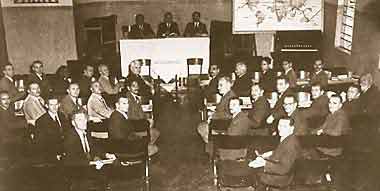1959 – Eighth General Conference Session
From May 28 to June 24, 1959, 32 delegates convened in Sao Paulo, Brazil. Twelve Unions and Fields, with 10,000 members, were represented. For the first time, after 22 years, the Yugoslavian Union was able to send its representatives to the General Conference session. From Romania, Hungary, and Czechoslovakia, only letters with greetings and news were read before the delegation.

Brother D. Nicolici, in his report, spoke about the work in the Philippines (started in 1956) and the contacts made in such countries as India, Burma, and Nigeria.
Consideration was given to the calls coming from Colombia, Venezuela, Central American countries (especially Guatemala), Mexico, as well as Spain and Portugal, and a resolution was made to send workers and canvassers to take advantage of the openings in these areas.
Among the doctrinal points brought to the attention of the delegation, there were questions about the identity of Melchisedec, interpretation of Hebrews 1:5, life insurance, trades in which a Reformer can or cannot engage, the use of one cup in the ordinances, the loud cry (Principles of Faith, point 16), and others.

Regarding point 16 of our Principles of Faith, the following recommendation was made: So that our teaching may not be misinterpreted, we should refer to the present work of reformation as leading to the fulfillment of the prophecy contained in Early Writings, pp. 85, 86. It is in this sense that point 16 should be read and understood.
General Conference officers for the next term: A. Lavrik, president; D. Nicolici, first vice president; E. Laicovschi, second vice president; I. W. Smith, secretary.

1963 – Ninth General Conference Session
Twenty-three delegates were present at Gross Gerau, Germany, from August 22 to September 19, 1963. The reported membership was approximately 11,000. Among the new fields, the Philippines were mentioned as the most promising one.

Outgoing President’s Address
Brother A. Lavrik, the outgoing president, expressed his gratitude to God for the privilege that He had given us of meeting again as a GC delegation in session. He briefly reviewed the history of the Reform Movement, some phases of which, as we could see, were not for encouragement. Our only hope and assurance for the future of our work, Brother Lavrik said, is found in the message of the Lord to King Jehoshaphat: “Believe in the Lord your God, so shall ye be established; believe His prophets, so shall ye prosper.” Our greatest need at this time, he emphasized, is the outpouring of the Holy Spirit. The question was put to the delegates, “Why do we not feel so urgently the need of the promised gift as in the early days of the message of reformation?” It is left for each one of us, he added, to seek the answer for himself on his knees before God. In order that the promised power may be ours, we must meet the conditions, preparing the way.
Brother Lavrik thanked the German Union for the substantial financial help extended to the General Conference during the past quadrennium (1959—1963), which made it possible to send out and support missionaries in four new missionary fields–Iberia, Central America, Philippines, and Nigeria.
He explained that, in the restricted countries, where religious liberty does not exist, we have thousands of brethren who, despite the most cruel oppression, stand firm in the truth. Some heart-rending experiences that had been endured by individual members, families, and groups living in these countries were narrated before the delegates.
Missionary Program
The delegation gave much attention to the missionary work and recommended the following program:
1. There is no better and more effective method than door-to-door work with literature (canvassing). All members, old and young, can take part in this work. By doing this work they gain a better Christian experience and increase in knowledge, as they feel the need to spend more time in study and prayer that they may be better able to answer questions.
2. If this work is properly developed, more funds will come in and the publishing work can be built up. Besides, more members will be added to the church, and more young people will be prepared to become Bible workers.
3. New methods should be devised, manuals of instruction should be prepared, and seminars should be conducted wherever possible, with a view to teaching our people to do the work efficiently. The book Colporteur Ministry should be studied by all.
4. Missionary families should be encouraged to settle and establish health food stores in areas where there are no churches or members.
5. It was also recommended that the incoming Executive Committee should appoint brethren to prepare manuscripts for books to be used in the canvassing work.
The Nigerian Question
Brother D. Nicolici was censured by the delegation for having ordained men who were not qualified for ordination (Nigeria, 1958). He apologized for his mistake, saying that he was deceived by those men.
Doctrinal and Administrative Points
A certain number of doctrinal questions were considered by the delegates (e.g., occupations inconsistent with our principles, health reform, proper Sabbathkeeping, preexistence of Christ, and others).
So that our belief would not be misconstrued, the question about the preexistence of Christ was answered, and our position on this point was reconfirmed, only with quotations from the Spirit of Prophecy and the Principles of Faith, point 2.
There were also administrative points on the agenda such as the administration of the American Union to be completely separated from that of the General Conference, the GC headquarters to be moved to a more suitable location, the General Conference to adopt a budget system, and regional secretaries to be placed in different strategic parts of the world.
Officers for the new term: C. T. Stewart, president; E. Kanyo, vice president; A. Balbach, secretary.


